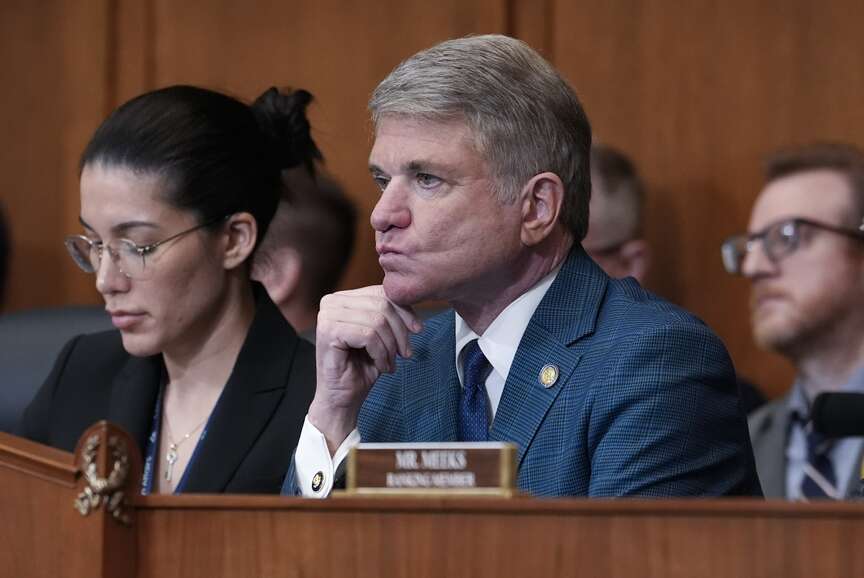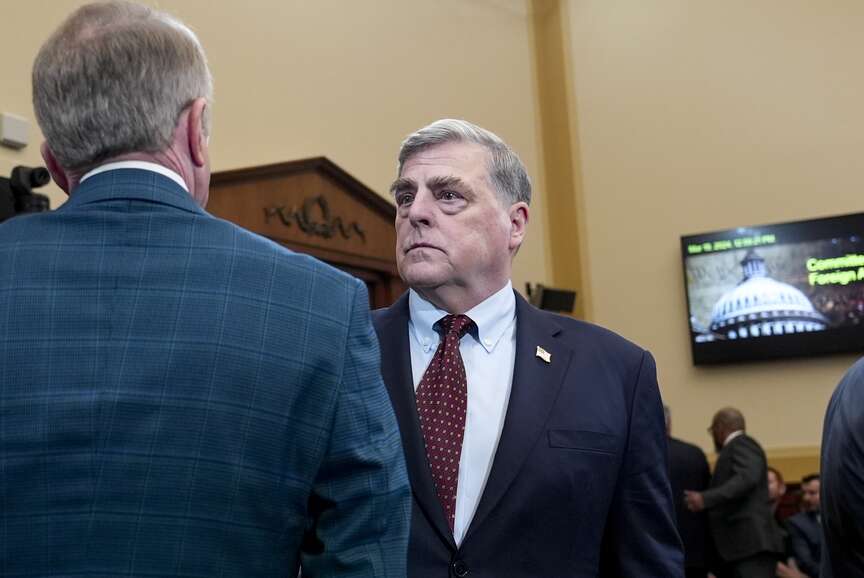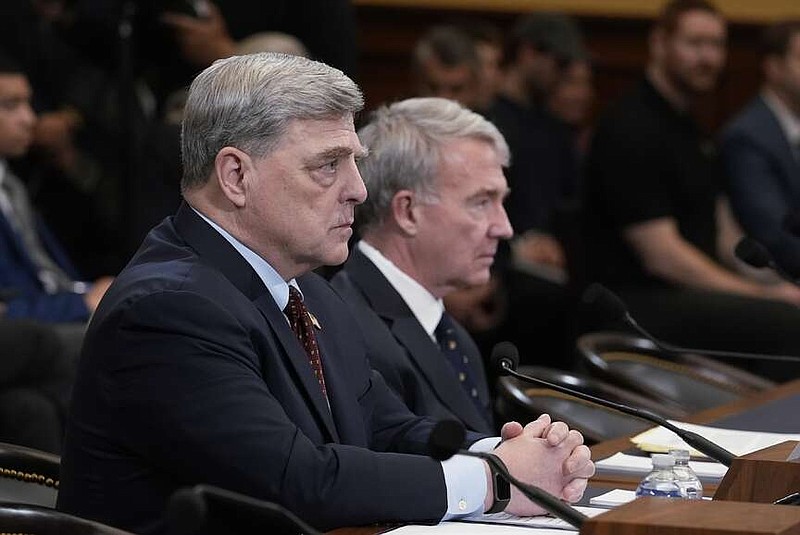WASHINGTON-- The top two U.S. generals who oversaw the evacuation of Afghanistan as it fell to the Taliban in August 2021 blamed the Biden administration for the chaotic departure, telling lawmakers Tuesday that it inadequately planned for the evacuation and did not order it in time.
The rare testimony by the two retired generals publicly exposed for the first time the strain and differences the military leaders had with the Biden administration in the final days of the war. Two of those key differences included that the military had advised that the U.S. keep at least 2,500 service members in Afghanistan to maintain stability and a concern that the State Department was not moving fast enough to get an evacuation started.
The remarks contrasted with an internal White House review of the administration's decisions, which found that President Joe Biden's decisions had been "severely constrained" by previous withdrawal agreements negotiated by former President Donald Trump and blamed the military, saying top commanders said they had enough resources to handle the evacuation.
Thirteen U.S. service members were killed by a suicide bomber at the Kabul airport's Abbey Gate in the final days of the war as the Taliban took over Afghanistan.
U.S. troops who survived the blast said they also came under gunfire, but U.S. military investigators found that the loss of life was linked to the single explosion. Military officials later agreed to review those findings and conduct additional witness interviews. The results are expected to be made public soon.
Thousands of panicked Afghans and U.S. citizens desperately tried to get on U.S. military flights that were airlifting people out. In the end, the military was able to rescue more than 130,000 civilians before the final U.S. military aircraft departed.
That chaos was the end result of the State Department failing to call for an evacuation of U.S. personnel until it was too late, former Joint Chiefs Chairman Gen. Mark Milley and U.S. Central Command retired Gen. Frank McKenzie told the House Foreign Affairs Committee.
Rep. Michael McCaul, R-Texas, the committee chairman, has highlighted in the past that Milley, McKenzie and other senior defense officials recommended against the United States' full withdrawal from Afghanistan in 2021 but that Biden disregarded their advice. The congressman said at the hearing's outset that his committee's investigation has uncovered "repeated instances" of the White House "refusing to listen" to such warnings.
During a hearing in February, McCaul accused leaders at the White House and the State Department of having "stuck their heads in the sand" as it became increasingly clear that Afghanistan's fall was imminent. Taliban fighters had overrun numerous cities and districts on their march to Kabul, facing nominal resistance from the Afghan security forces trained and subsidized by the U.S. government for more than 20 years.
"On 14 August, the non-combatant evacuation operation decision was made by the Department of State and the U.S. military alerted, marshaled, mobilized and rapidly deployed faster than any military in the world could ever do," Milley said.
But the State Department's decision came too late, Milley said.
"The fundamental mistake, the fundamental flaw was the timing of the State Department," Milley said. "That was too slow and too late."
Evacuation orders must come from the State Department, but in the weeks and months before Kabul fell to the Taliban, the Pentagon was pressing the State Department for evacuation plans and was concerned that State was not ready, McKenzie said.
"We had forces in the region as early as 9 July, but we could do nothing," McKenzie said, calling the State Department's timing "the fatal flaw that created what happened in August."
"I believe the events of mid- and late August 2021 were the direct result of delaying the initiation of the (evacuation) for several months, in fact until we were in extremis and the Taliban had overrun the country," McKenzie said.
Milley was the nation's top-ranking military officer at the time and had urged Biden to keep a residual force of 2,500 there to give Afghanistan's special forces enough backup to keep the Taliban at bay and allow the U.S. military to hold on to Bagram Air Base, which could have provided the military additional options to respond to Taliban attacks.
Biden did not approve the larger residual force, opting to keep a smaller force of 650 that would be limited to securing the U.S. embassy. That smaller force was not adequate to keeping Bagram, which was quickly taken over by the Taliban.
Military personnel would have been "much better prepared to conduct a more orderly" evacuation, Navy Rear Adm. Peter Vasely, the top U.S. commander in Kabul during the operation, told Army investigators, "if policymakers had paid attention to the indicators of what was happening on the ground."
Biden administration officials have fiercely disputed those characterizations, saying that while early parts of the evacuation were difficult, the U.S. government eventually stabilized security well enough to airlift people from harm's way. That was made possible in part by McKenzie striking a deal with the Taliban in which the militants would provide security outside the international airport in Kabul while U.S. forces manned the airfield's perimeter.
The Taliban have controlled Afghanistan since the U.S. departure, resulting in many dramatic changes for the population, including the near-total loss of rights for women and girls.
The White House found last year that the chaotic withdrawal occurred because Biden was "constrained" by previous agreements made by Trump to withdraw forces.
That 2023 internal review further appeared to shift any blame in the Aug. 26, 2021, suicide bombing at Hamid Karzai International Airport, saying it was the U.S. military that made one possibly key decision.
"To manage the potential threat of a terrorist attack, the president repeatedly asked whether the military required additional support to carry out their mission at [the airport]," the 2023 report said, adding, "senior military officials confirmed that they had sufficient resources and authorities to mitigate threats."
A message left with the State Department was not immediately returned on Tuesday.
Information for this article was contributed by Tara Copp of The Associated Press and by Dan Lamothe, Abigail Hauslohner and Leigh Ann Caldwell of The Washington Post.
 House Foreign Affairs Committee Chairman Mike McCaul, R-Texas, leads his panel on an assessment of the withdrawal from Afghanistan, at the Capitol in Washington, Tuesday, March 19, 2024. Retired Gen. Mark Milley, the former chairman of the Joint Chiefs of Staff, left, and retired Gen. Kenneth McKenzie, former commander of the U.S. Central Command, testified. (AP Photo/J. Scott Applewhite)
House Foreign Affairs Committee Chairman Mike McCaul, R-Texas, leads his panel on an assessment of the withdrawal from Afghanistan, at the Capitol in Washington, Tuesday, March 19, 2024. Retired Gen. Mark Milley, the former chairman of the Joint Chiefs of Staff, left, and retired Gen. Kenneth McKenzie, former commander of the U.S. Central Command, testified. (AP Photo/J. Scott Applewhite) Retired Gen. Mark Milley, the former chairman of the Joint Chiefs of Staff, center, speaks with House Foreign Affairs Committee Chairman Mike McCaul, R-Texas, left, as the panel holds a hearing on the withdrawal from Afghanistan, at the Capitol in Washington, Tuesday, March 19, 2024. (AP Photo/J. Scott Applewhite)
Retired Gen. Mark Milley, the former chairman of the Joint Chiefs of Staff, center, speaks with House Foreign Affairs Committee Chairman Mike McCaul, R-Texas, left, as the panel holds a hearing on the withdrawal from Afghanistan, at the Capitol in Washington, Tuesday, March 19, 2024. (AP Photo/J. Scott Applewhite)

